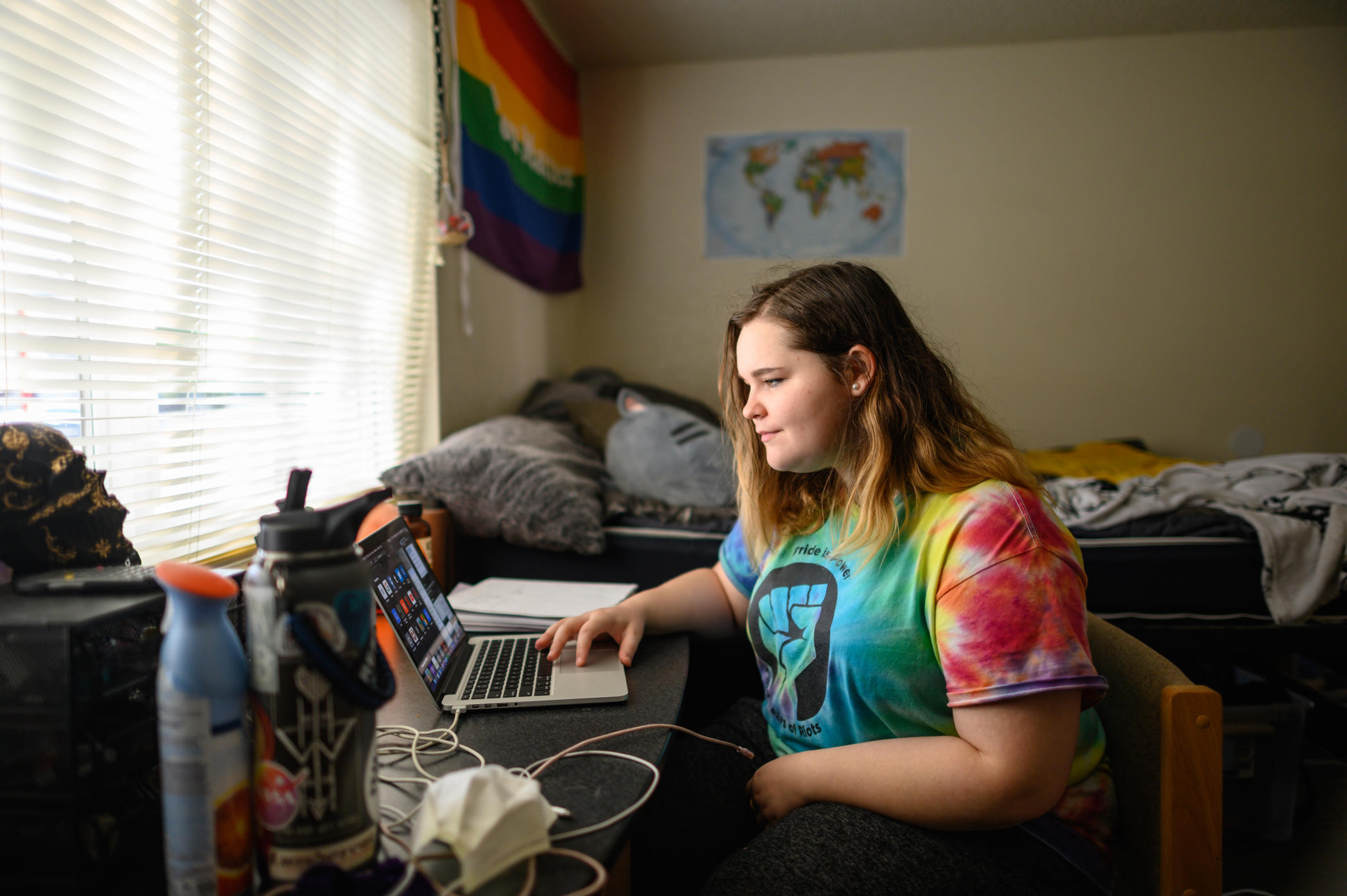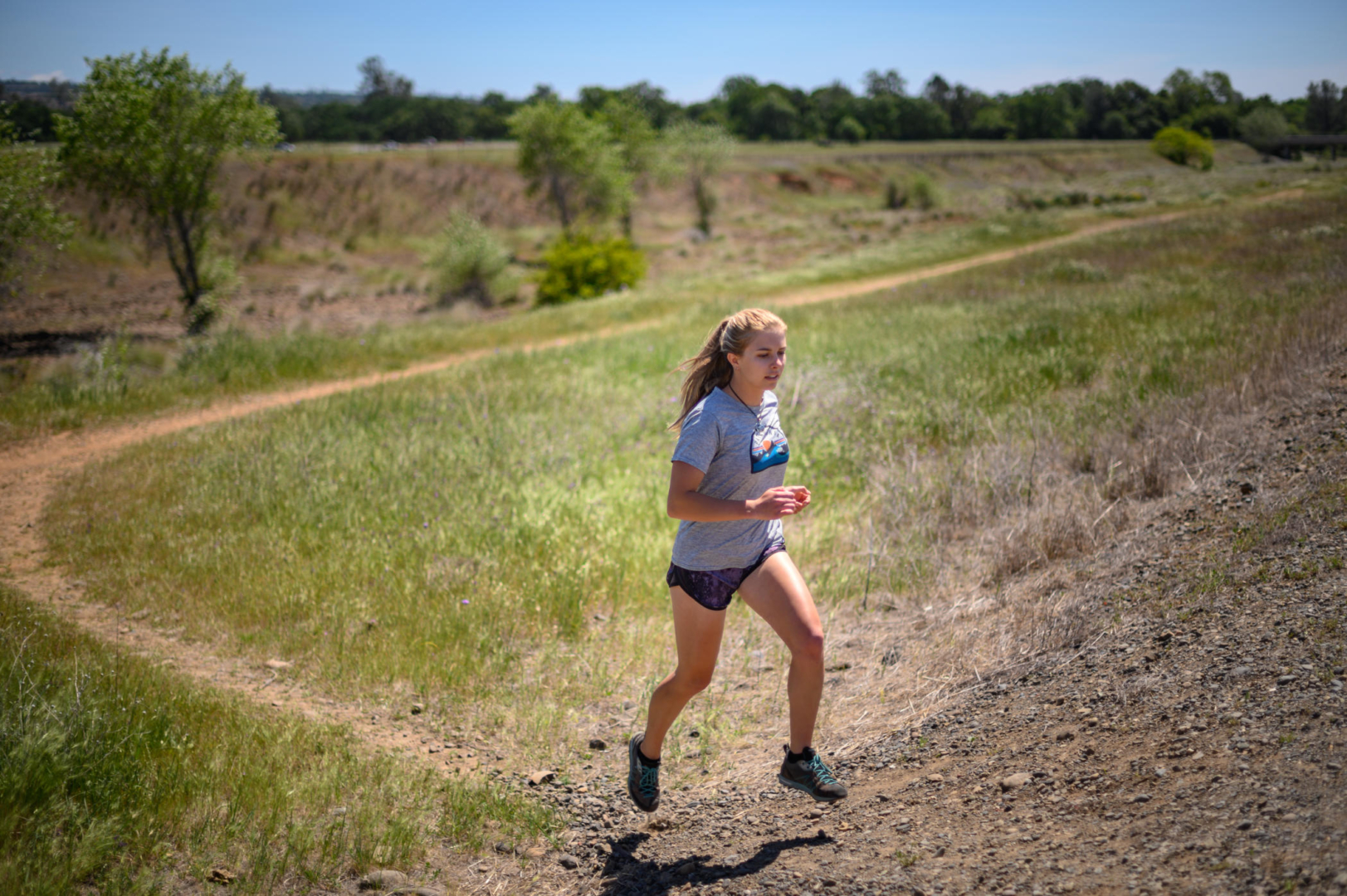How to: Find Happiness and Leisure Amid a Lockdown

Selah Hartman works on her computer in her room in University Village (UV) as the campus community adjusts to suspension of in-person instruction due to impacts of the coronavirus (COVID-19) pandemic on Wednesday, April 22, 2020 in Chico, Calif. (Jason Halley/University Photographer/CSU, Chico)
Another day on Zoom calls. Another evening of helping kids with their online lessons. Another day of distancing from friends and family. Times are different, and a sense of unrelenting routine and helplessness can set in.
Experts say one of the best ways to combat those feelings is through relaxation and finding happiness, but how do you do that when things feel so overwhelming? Two faculty experts in the Recreation, Hospitality, and Parks Management Department share their ideas to foster well-being through small, everyday activities.
Professor Matthew Stone recently spent a semester as a Fulbright Scholar in Finland, which has been labeled for three years in a row by the United Nations as the Happiest Country on Earth. He brought home several ideas that can be useful at any time, but which have been especially helpful amid the uncertainty and new routines of COVID-19.
- Set an end to your work day. The work day is different in Finland, where working late is not encouraged because it cuts into family time. Try to set a concrete end to your work day—and encourage your employees and coworkers to do the same. Be aware that your colleagues are juggling multiple responsibilities while working for home and may have different work hours than you. If you receive an email at 8 p.m. during your “off” time, you don’t need to respond in the moment. Family and personal life are important to well-being.
- Take breaks. Coffee breaks are an essential part of Finnish culture. Make something similar part of your routine. A couple times a day, drop what you are doing, grab a drink, and chat with a friend—even if it is just by text.
- Give yourself permission to disconnect. It is common for Finns to spend weeks at a cottage (mökki) in the countryside, often without internet or electricity. While Americans do not have as many vacation days as Europeans or the means to travel anywhere, just a couple of days separated from news and Netflix can help to give your worrying mind a hard reset.
- Appreciate and take advantage of local nature. Finland, like California, places a great value on the natural environment. This can be as simple as a walk in your neighborhood, a bike ride, or a stroll in the park.

Leisure time is critical, agrees Professor Jesse Engebretson. He explains that many national surveys of mental health and well-being attempt to measure the relative happiness of communities and nations, and they often find that leisure is a key contributor.
Engebretson mentioned that a wide range of activities can be done that are relevant to a diversity of people, but he suggests playing socially distanced outdoor games with very small groups of friends or family or simply going on a walk in nature while actively—and mindfully—listening to natural sounds. Even crafting or simply or observing nature can contribute to happiness.Whatever the activity, he says that it’s beneficial to engage in an activity that allows you to focus on the moment.
“Engaging in immersive and meaningful recreational activities can lead to positive relationships with other people or the environment,” Engebretson said, “Given the chaos of the moment, experiencing a flow state, or ‘the zone’ may be particularly fulfilling.”
Stone notes that travel and time with loved ones are an important part of leisure time for many Americans, and recent surveys have shown that the current lack of travel opportunities is taking an emotional toll on Americans.
Stone’s research for the World Food Travel Association found that when people see certain foods they are reminded of past trips. He advises that if you miss your mom’s cooking but can’t enjoy a meal together, consider asking for a favorite recipe and making it yourself. Or, visit World Market or a local import store to find foods that you enjoyed on a trip. Then, make a dinner and movie night, where you can watch a travel show or a movie set at that destination, and reminisce about the good times you had, and eat a meal to match.

“Nothing will replace travel,” Stone says, “But even if you have not had the opportunity to travel a lot, creating a little travel event at home gives you and your family something to plan, something to look forward to, and something to experience—three reasons we love travel.”
Stone acknowledges we all have different amounts of time, money, and mental space to try all of these ideas, and the reality is some people may not be able to. But if we can, we should, he said, because the rewards will be well worth it.


